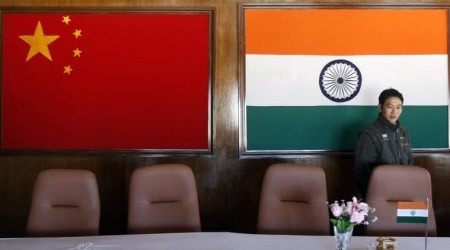 External affairs minister Sushma Swaraj. (File)
External affairs minister Sushma Swaraj. (File)
On July 27, as Nawaz Sharif’s prime ministership of Pakistan was unravelling, a young Pakistani woman who needed a medical visa tweeted her distress to External Affairs Minister Sushma Swaraj. She pleaded that she could not meet a new condition for Pakistanis to be eligible for a medical visa — a letter from the country’s foreign minister — because “my country has no government”. Swaraj tweeted to the Indian High Commissioner: “Gautam Bamabawale ji, inhen visa dey do”.
Issuing orders to the bureaucracy over Twitter may be the new normal, but issuing the medical visa selectively to some in this manner while denying it to others in equal or more distress does no credit to India’s credentials. Earlier in July, Swaraj made a similar exception, granting a 24-year-old young man from Rawalakot in Pakistan-occupied Kashmir, a medical visa for treatment in New Delhi. Osama Ali had been diagnosed with a massive tumour on his liver. His father, a lawyer, had consulted a doctor at a private hospital in Delhi. The doctor had asked them to come to Delhi for treatment, which includes a liver transplant. But they had come up against the same problem: The young man and his family members could not get a medical visa in the normal course because of a new rule that the applicant needed a letter from Sartaj Aziz, then then de facto foreign minister of Pakistan.
After Ali’s case was published in this newspaper, Swaraj announced she was waiving the condition as he was a resident of PoK, territory that belonged to India. Predictably, there was plenty of applause from the galleries for her generosity, and much advice against showing kindness to “traitors”. The father of the young man said he was profusely thankful to the minister.
The medical visa has been one of India’s biggest instruments of soft power in the region, perhaps second only to Bollywood. Treatment at private Indian hospitals, at a fraction of the cost in Europe, America or South-east Asia, draws people here from other countries, especially from the neighbourhood, like a magnet.
Last month, Minister of State for Tourism & Culture Mahesh Sharma told the Rajya Sabha in a written response to a question that the number of foreign nationals arriving in India on medical/medical attendant visas was 1,84,298 in 2014; 2,33,918 in 2015; and 3,61,060 in 2016. Most of them are from South Asia, where none of the other countries have the tertiary healthcare services that India has, though some of them have better national health indices.
While Indian private hospitals have greatly profited from this inflow, India has basked in the reflected glory of the range of expertise Indian specialists provide to fee-paying patients, from treatment of cancers to cardiac diseases, obesity to knee replacements, even though the country itself lags terribly behind on many global health indices. Last year in September, after a deadly bomb blast in Kabul targeting the Hazara community killed 80 people, many survivors arrived for treatment in Delhi. According to a report in The Wire, 53 of the victims were treated at three private Delhi hospitals, with the Hazara expatriate community shouldering the bills for most, and the Indian government also chipping in.
With Pakistan, the medical visa has been a useful way for India to convey that it separates the people from the state. It enabled New Delhi to show itself as helpful and considerate toward Pakistanis even while its relationship with the state teetered between bad and ugly. It was also a way to flaunt to the Pakistani establishment that many of its citizens were voting with their feet for services their own country had failed to provide.
On any given day in Pakistan, there used to be at least six to eight persons applying for a medical visa at the Indian High Commission. The number of medical visas issued could easily run into a couple of thousands a year. The applications were usually dealt with expeditiously, and visas given in a couple of days if the applicant had all the documentation — an Indian doctor’s opinion, and a letter from the doctor saying s/he had accepted the applicant as a patient.
The new condition that the applicant must produce a letter from the foreign minister to the Indian High Commission was introduced in May. When the Indian High Commission began rejecting visas for medical applicants, the Pakistan Foreign Office summoned the Indian High Commissioner in Islamabad, Gautam Bambawale, for an explanation.
Publicly, no reason has been given, though Swaraj has appeared to link it to Pakistan’s refusal to give a visit visa to the mother of Kulbhushan Jadhav, sentenced to death by a military court in Pakistan. In a series of tweets on July 10, Swaraj criticised Aziz’s failure to respond to her letter asking for a visa for Jadhav’s mother, though she too drew no direct connection between the two.
Introducing a new obstacle for people in medical distress trying to access healthcare is not just cruel, it makes no diplomatic sense.
But it certainly is of a pattern established over 70 years of India-Pakistan failure to normalise relations: When Indian and Pakistani leaders can’t find other ways to settle scores, they target the most vulnerable of each other’s nationals. It used to be prisoners, now it also includes people needing medical treatment. In truly feudal fashion, exceptions are made to the rule, which make individual actors in the system appear larger than life for their one-time generosity, or win them applause for scoring cheap political points.
“My son’s heart beats for Madam Sushma Swaraj”. Those words were spoken by the grateful parent of a four-month old. In truth, his gushing gratitude only highlighted how India has shut down this window for all the others who need it.

